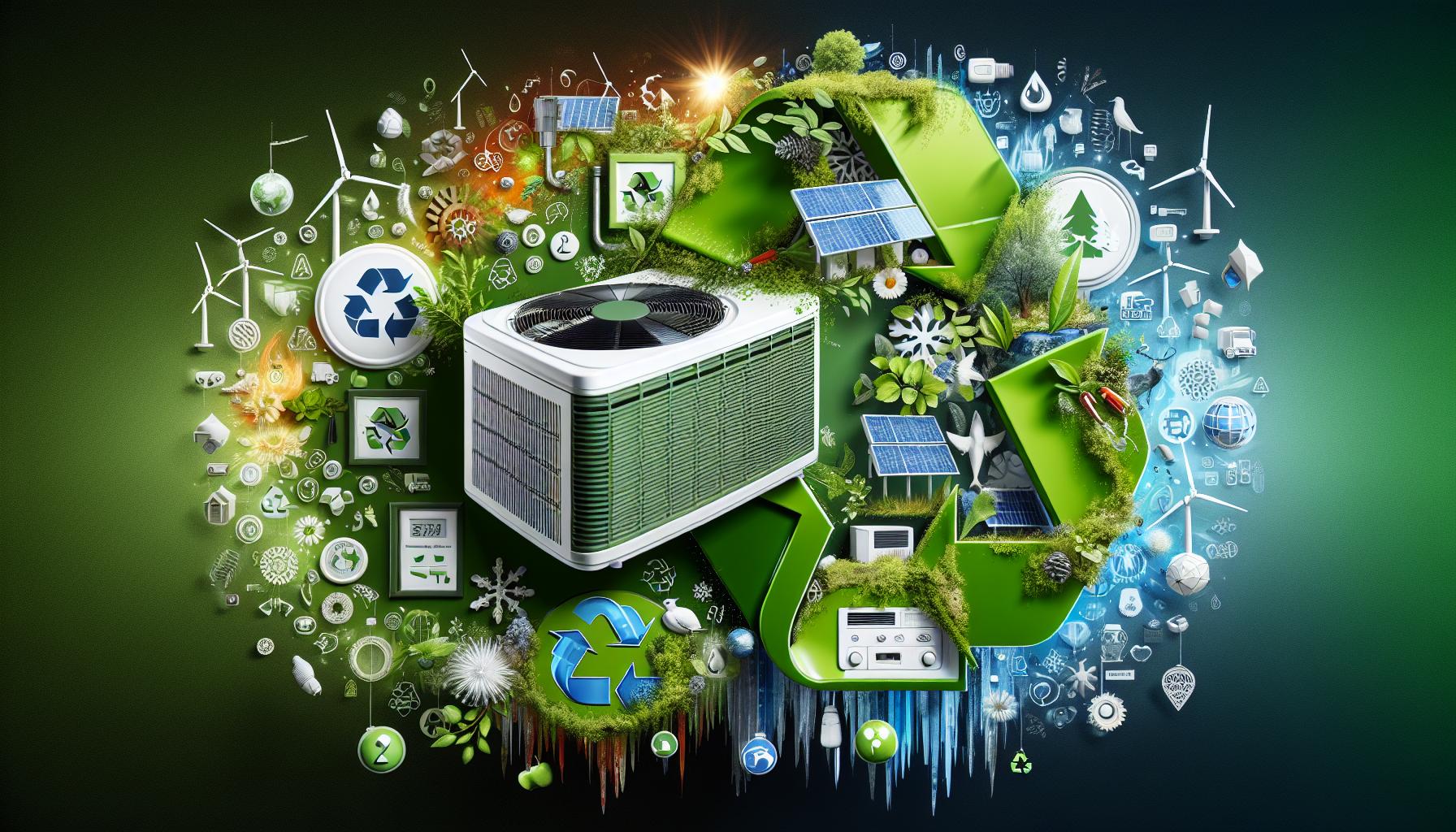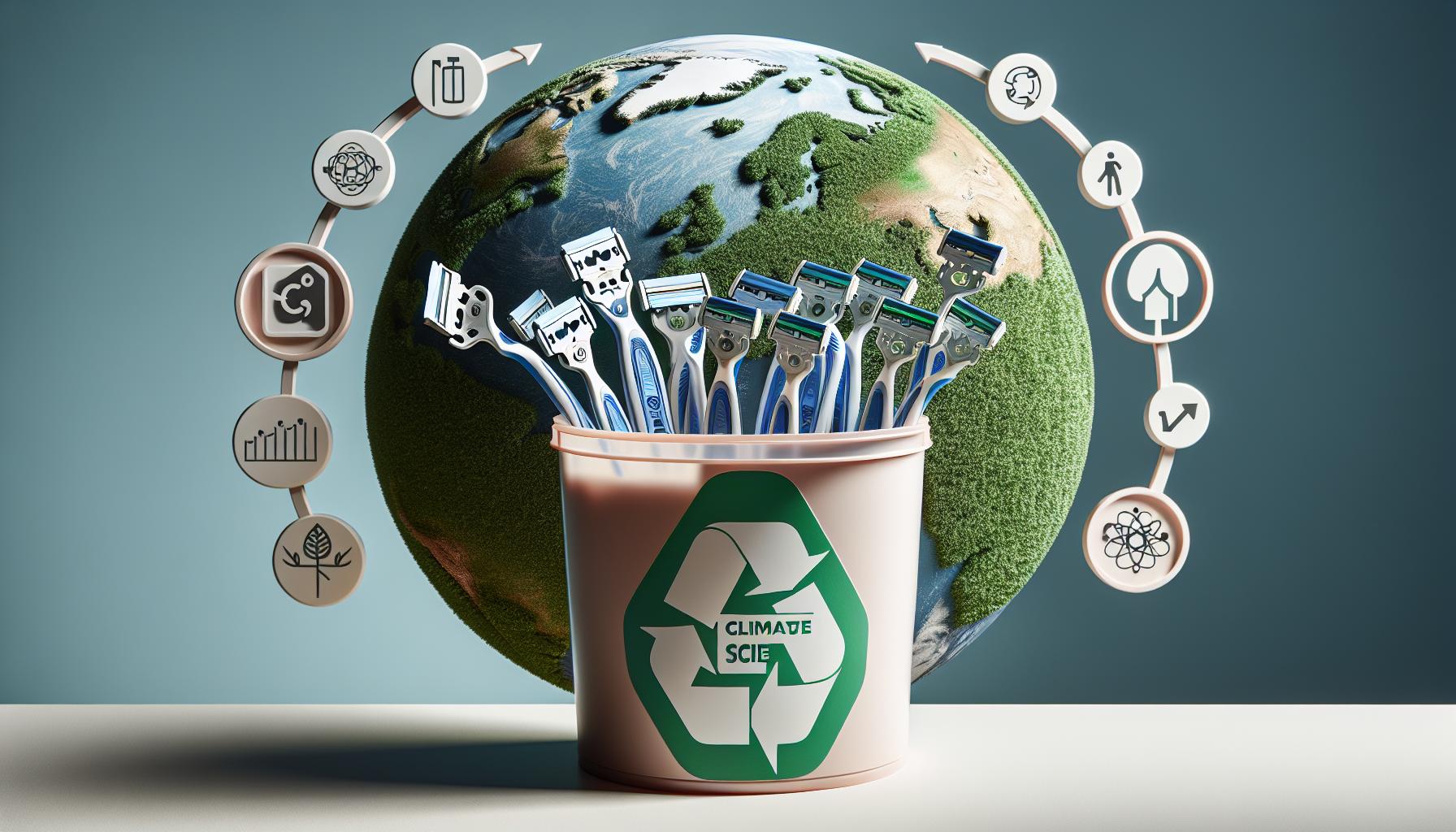Did you know that improper disposal of old air conditioning units can release harmful greenhouse gases into the atmosphere? As these appliances reach the end of their lifecycle, it’s vital to explore responsible disposal solutions that not only protect the environment but also align with community sustainability goals.
Air conditioning units often contain materials that can be detrimental to our planet if not handled correctly, making it essential for homeowners and businesses to consider eco-friendly recycling options. By choosing professional disposal services, you’re not only ensuring compliance with environmental regulations but also contributing to a cleaner, healthier ecosystem.
In this article, we’ll delve into effective strategies for air conditioning unit disposal, highlighting the importance of recycling and the positive impact it can have on both your local community and the broader environment. Join us as we uncover how you can play a significant role in promoting sustainable waste management practices.
Understanding the Importance of A C Recycling
Cooling systems such as air conditioners play a fundamental role in maintaining comfortable indoor environments, particularly in regions with extreme temperatures. However, what often goes unnoticed is the critical importance of properly recycling and disposing of these units when they reach the end of their operational life. In fact, nearly 9 million air conditioning units are disposed of each year in the United States alone, and the way we address this dispossession can have profound implications for our environment and our health.
When an air conditioning unit is not disposed of responsibly, it can contribute to a myriad of environmental hazards. Most units contain chlorofluorocarbons (CFCs) and other harmful chemicals that, when released into the atmosphere, can deplete the ozone layer and exacerbate climate change. goes beyond just compliance with regulations; it’s about actively protecting our planet and ensuring that hazardous materials are managed appropriately. By recycling A C units, we can recover valuable metals, plastics, and other materials, reducing the need for virgin resources and minimizing waste.
Community and Economic Benefits
Embracing A C recycling also offers significant community and economic advantages. By fostering a culture of recycling, local communities can create jobs in the recycling and waste management sectors and stimulate local economies. Additionally, educational initiatives around recycling can raise awareness about broader sustainability practices, encouraging individuals to adopt more eco-friendly behaviors in other areas of their lives.
Ultimately, empowers individuals to take meaningful action in their communities. It transforms a simple act of disposal into an opportunity for positive change, guiding us toward a more sustainable future where every component of our modern life, including air conditioning units, contributes to a healthier planet. The commitment to responsible A C recycling reflects a collective endeavor to mitigate environmental threats and build a resilient, sustainable society for generations to come.
Types of A C Unit Disposal Methods
The end of an air conditioning unit’s life cycle presents an important opportunity to make responsible decisions regarding disposal. With millions of units retired annually, understanding the various disposal methods can empower consumers to act in an environmentally friendly manner. Each method varies in environmental impact, cost, and ease of implementation, which is essential knowledge for anyone considering the disposal of an old AC unit.
A prevalent method for disposing of air conditioning units is through recycling. This entails taking the unit to specialized recycling facilities that are equipped to handle hazardous materials and reclaim valuable resources. Recycling centers extract metals, plastics, and other components, thus preventing them from ending up in landfills. For example, aluminum and copper are commonly found in AC units and can be reused in manufacturing new products, significantly reducing the need for new raw materials.
Another option is donation. If your air conditioning unit is still functional, consider reaching out to local nonprofits or community centers that may benefit from such equipment. This not only extends the life of the unit but also provides a service to those who might not otherwise afford cooling solutions. Organizations like Habitat for Humanity often have programs in place to accept such donations, effectively reducing waste and serving community needs.
Landfill disposal is the least desirable method and is heavily regulated due to the environmental hazards associated with improper handling of CFCs and other toxic substances. If nothing else is feasible, it is crucial to ensure that the unit is disposed of in accordance with local regulations, which often require specific protocols to safely contain harmful chemicals. In some areas, hazardous waste collection events or specialized waste facilities might be available to properly manage these materials.
Finally, engaging professionals for disposal services presents a convenient solution that alleviates the complexities of disposal. Certified disposal companies ensure compliance with environmental regulations and often provide proper recycling and waste management services. While this may involve a service fee, it guarantees that the unit is handled responsibly.
By evaluating these disposal methods – recycling, donation, regulated landfill disposal, and professional services – individuals can make informed and responsible choices that significantly contribute to environmental sustainability. Each option carries its own benefits and responsibilities, and understanding these nuances can foster a culture of proactive environmental stewardship in our communities.
The Environmental Impact of Improper Disposal
The improper disposal of air conditioning units poses significant environmental risks, particularly due to the refrigerants and various hazardous materials contained within these appliances. Many older AC units utilize chlorofluorocarbons (CFCs), which are potent greenhouse gases. When an AC unit is disposed of irresponsibly-such as being dumped in a landfill or left abandoned-these substances can leak into the atmosphere, contributing to ozone layer depletion and exacerbating climate change. The impact is not just limited to global warming; it can also lead to local air and water pollution, affecting wildlife and human health.
Improper disposal affects communities in several ways. Contaminated landfills can leach harmful chemicals into the soil and groundwater, posing health risks to nearby populations and ecosystems. Additionally, if discarded units are not properly reclaimed for their metals and plastics, valuable resources are wasted. The extraction and production of new materials consume energy and contribute to pollution, creating a cycle of environmental degradation. Meanwhile, the sheer volume of units wrongly discarded adds to an already overflowing waste management crisis.
Solutions to Mitigate Environmental Impact
Taking proactive measures to dispose of AC units responsibly can significantly reduce these negative effects. Here are practical steps that individuals and communities can take:
- Educate Yourself: Understanding the components and potential hazards of your AC unit can help inform your disposal choices.
- Use Certified Disposal Services: Engaging with professionals trained in handling hazardous materials ensures compliance with environmental regulations.
- Promote Recycling Initiatives: Supporting or starting local recycling programs can bridge gaps in community waste management and foster a culture of sustainability.
- Advocate for Policy Changes: Lobbying for tighter regulations on the disposal of electrical appliances can help reduce improper disposal rates.
While the challenges posed by improper disposal can feel overwhelming, raising awareness and adopting responsible practices empowers individuals to make a positive impact. By facilitating proper disposal and embracing recycling, communities can significantly minimize environmental harm and contribute to a healthier planet. Ultimately, informed choices today pave the way for a cleaner, more sustainable tomorrow.
Step-by-Step Guide to Responsible A C Disposal
When it comes to disposing of your air conditioning unit, responsible action begins well before you lift a finger to haul it away. Each year, millions of AC units are discarded improperly, driving home the urgent need for an effective disposal plan that mitigates environmental harm. By following an informed process, you can ensure that your old AC unit is recycled or disposed of safely, preserving valuable resources and protecting our planet.
Evaluate Your Unit
To begin with, assess the condition of your air conditioning unit. If it’s still functional, consider donating it or selling it at a discounted price through local community groups or online marketplaces. Many community centers, schools, or even charities may accept working units, particularly in areas where heating and cooling needs are most urgent. If it is beyond repair, the next steps are crucial for responsible disposal.
Locate a Certified Disposal Service
Finding the right disposal service is a critical part of the process. Look for local waste management companies or specialized HVAC contractors that are certified to handle and recycle air conditioning units. These professionals are equipped to remove the hazardous components safely, such as refrigerants, and ensure that they do not leak into the environment. Start your search by checking local government resources or environmental agencies that often provide directories of certified disposal services.
Prepare for Pick-Up
Once you select a service, preparation is key. Clear the area around your AC unit for easy access. If the unit is outside, ensure no obstructions block its path, and if it’s heavy, consider manipulating it safely or engaging professionals who can manage heavy lifting. Some disposal services may also offer pick-up options for an additional fee, which can save you the hassle of transporting it yourself.
Follow-Up on Recycling
After disposal, don’t hesitate to follow up with your service provider to ensure that your unit was handled appropriately. Many reputable services will provide information about where the unit was taken and how it was recycled. This transparency not only builds trust but also fosters a sense of community commitment toward sustainable practices.
By incorporating these thoughtful steps into your AC unit disposal routine, you contribute not only to a cleaner local environment but also to global efforts against climate change. Each responsible action adds up, creating a ripple effect of awareness and action. As a community, we can inspire others to follow suit, perpetuating a culture of environmental responsibility that benefits everyone.
Finding Local A C Recycling Facilities
Finding an appropriate facility to recycle your air conditioning unit can make a significant difference in reducing its environmental impact. With improper disposal rates alarmingly high, knowing where and how to recycle responsibly is essential. Fortunately, there are numerous resources available to guide you in locating local recycling facilities specifically designed for air conditioning units.
To start your search, you can utilize a variety of avenues. Begin by checking local waste management websites or municipal government resources; many cities provide lists of certified recycling centers. Additionally, organizations focused on environmental sustainability often maintain directories of services that meet specific regulations for hazardous waste disposal, including refrigerants found in many AC units. Engaging with local environmental agencies can also connect you with facilities that specialize in electronic waste recycling, as air conditioning units contain various components requiring safe and responsible handling.
Consider reaching out to HVAC contractors in your area. Many of these professionals not only remove old units but also partner with recycling centers to ensure proper disposal. They often have established relationships with recycling facilities and can provide recommendations based on your needs. You might also find that some retailers offer take-back programs, where they will recycle your old unit for you when you purchase a new one from them. This initiative not only simplifies the process but also encourages responsible consumption.
Lastly, online platforms or community boards can provide additional insight into local recycling options. Websites like Nextdoor or Facebook community groups allow you to connect with neighbors who may have faced similar situations. You may discover local initiatives or resources you were unaware of. You can also search local review platforms for customer feedback about specific recycling facilities, ensuring you choose a reputable option that adheres to environmentally responsible practices.
In essence, the key to finding local air conditioning recycling facilities lies in leveraging available resources, from municipal websites to community networks. By taking these steps, you ensure that your old unit is disposed of safely, contributing to a circular economy that prioritizes sustainability and environmental health.
Cost Considerations for Air Conditioning Disposal
Disposing of an air conditioning unit doesn’t just involve switching it out for a new one; it’s an important decision that can come with various costs. Understanding the financial implications of AC disposal can help homeowners and businesses make educated decisions that not only meet their fiscal needs but also align with sustainable practices. The expenses associated with AC unit disposal can vary widely based on factors such as local regulations, the method of disposal, and specific recycling facilities used.
When considering disposal, it’s essential to take into account potential costs as well as savings. Many local governments offer free or subsidized recycling programs aimed at promoting environmentally responsible disposal methods. These programs may include collection events or drop-off sites that help alleviate the financial burden of disposal. However, if your area does not provide such options, consider contacting professional HVAC contractors who often include disposal as part of their replacement services. While this may involve a fee, it can save you time and ensure that the unit is recycled properly.
Cost Breakdown for Disposal Options
Various disposal methods come with their own set of costs. Here’s a brief overview:
- Municipal Collection: Often free or minimal cost, but may require advanced scheduling and validation of household residency.
- Professional Disposal Services: Typically ranges from $50 to $200 depending on service inclusions, location, and unit size.
- Retailer Take-Back Programs: Some businesses offer trade-in deals where the cost of disposal is integrated into the purchase price of a new unit, potentially saving you money.
- DIY Disposal: While this might seem economical, it can involve hidden costs such as transportation and potential fines from improper disposal if not done correctly.
Understanding the cost of disposing of an air conditioning unit can provide transparency in your decision-making process. Many people are genuinely concerned about the environmental impacts of improper disposal, which can lead to substantial financial repercussions, such as fines or liabilities. By proactively selecting a responsible disposal method, individuals not only contribute positively to their community and the environment but can often find financial advantages that offset the initial costs of replacement.
DIY Disposal: Safe Techniques and Best Practices
DIY disposal of an air conditioning unit can not only be economic but also environmentally responsible when executed properly. Many individuals opt for a do-it-yourself approach due to potential cost savings, but it’s essential to be aware of the best practices and techniques to ensure safety and compliance with local regulations. Improper disposal can lead to environmental hazards, including the release of refrigerants that contribute to greenhouse gas emissions, which is why a careful and informed approach is crucial.
Before embarking on the DIY disposal journey, you should first understand any local regulations related to refrigerant handling and disposal. Many areas require specific procedures for safely removing and transporting refrigerants, often mandating that a certified technician handle these tasks. Once you are familiar with the legal constraints, follow these safe techniques:
- Prepare the Unit for Disposal: Disconnect power to the unit, ensuring it’s turned off at the breaker. This step is critical to avoid electrical hazards.
- Recover Refrigerants: If your unit uses refrigerants like R-22 or R-410A, they should be recovered using specialized equipment. This is typically done by certified professionals, so consider arranging for a technician to do this.
- Disassemble the Unit: If you possess the necessary skills and tools, carefully disassemble the air conditioning unit. Be cautious around sharp edges and heavy components. Remove metal, plastic, and other recyclable materials when possible.
- Transport to Recycling Facilities: Make sure to take the unit to a local recycling facility that accepts air conditioning units. Prioritize sites that ensure proper recycling methods for hazardous materials.
If hiring a professional for refrigerant recovery is out of your budget, consider community events or initiatives, such as local hazardous waste disposal days. Many communities sponsor these events to assist residents in disposing of hazardous waste safely and at no cost.
Incorporating effective recycling methods and raising awareness about the proper disposal of air conditioning units can have a positive impact at a community level. Engaging with neighbors and sharing your DIY experiences can foster a collective understanding of the importance of sustainable practices. As you take steps toward responsible disposal, remember that your actions contribute to a healthier environment, paving the way for others to follow suit. Whether it’s organizing a neighborhood clean-up or educating others about the environmental impacts of improper disposal, you can inspire a culture of awareness and action within your community.
Common Myths About A C Unit Recycling
Dispelling misconceptions about air conditioning unit recycling is essential for individuals seeking to make environmentally conscious decisions. Many people are misinformed about the complexities of A C unit disposal, leading to unintentional harm to the environment or wasted opportunities for responsible recycling. By understanding the truths behind these myths, homeowners can greatly enhance their efforts to dispose of their units properly and sustainably.
One prevalent myth is the belief that all air conditioning units can simply be thrown into the trash or left on the curb for garbage collection. In reality, this practice can lead to significant environmental hazards. Most A C units contain refrigerants, which can be harmful when released into the atmosphere. Local regulations often prohibit this type of disposal, emphasizing that proper handling and recovery of refrigerants require specialized equipment and professional training. Understanding this can encourage individuals to seek out certified technicians or community resources for responsible disposal.
Another misconception is that recycling A C units is too costly or complicated. While there may be upfront costs associated with hiring professionals for refrigerant recovery, many communities offer programs to assist with hazardous waste disposal at little to no charge. Additionally, recycling facilities often accept air conditioning units for free or at a nominal fee. The long-term environmental benefits of recycling – such as the recovery of valuable materials and the reduction of landfill waste – outweigh the initial expense.
Moreover, some people incorrectly believe that all parts of an air conditioning unit can be recycled. While metals, plastics, and certain components are indeed recyclable, some materials may need special handling or processing. Understanding what can and cannot be recycled can help streamline the disposal process and ensure that valuable resources are appropriately reclaimed.
By confronting these common misconceptions, individuals can take more informed steps toward responsible A C unit disposal. Engaging in conversations with friends, family, and community members about the real facts can help spread awareness and promote best practices in recycling and sustainability. Being proactive not only enhances personal knowledge but also fosters a more conscientious community oriented toward protecting our environment.
The Benefits of Professional Disposal Services
In today’s environmentally conscious society, the significance of adhering to proper disposal methods for air conditioning units cannot be overstated. Professional disposal services offer numerous advantages that not only support individual homeowners but also contribute to broader community efforts in maintaining ecological balance and sustainability. By entrusting experts with the disposal of their A C units, individuals can ensure that hazardous materials are handled safely, recyclable components are appropriately processed, and the environmental impact is minimized.
One of the primary benefits of utilizing professional services is their expertise in dealing with refrigerants such as chlorofluorocarbons (CFCs) and hydrochlorofluorocarbons (HCFCs), which can be detrimental to the ozone layer if released into the environment. Professionals are equipped with the specialized training and equipment necessary for safe refrigerant recovery, preventing any risk of harm that might arise from improper handling. This careful approach significantly reduces the likelihood of pollution and promotes a cleaner environment for everyone.
Furthermore, relying on experts can expedite the recycling process. Professional disposal services often have established partnerships with recycling facilities that specialize in air conditioning units, enabling efficient sorting and processing of materials. With their knowledge of local regulations and requirements, these professionals can navigate the complexities of disposal laws, ensuring compliance and reducing the risk of legal issues for homeowners.
In addition to environmental and regulatory advantages, engaging professional services can also be a time-saver. Homeowners often have busy lives, and coordinating the logistics of A C unit disposal-from transportation to paperwork-can become overwhelming. Professionals take care of these details, allowing individuals to focus on their daily responsibilities while ensuring that their old units are disposed of responsibly.
Ultimately, investing in professional disposal services is a step towards fostering a sustainable future. Homeowners not only make a smart choice for their immediate needs but also contribute positively to their local communities and the planet as a whole. By choosing to work with experts, individuals play a vital role in promoting responsible recycling practices, highlighting the importance of awareness and action in addressing environmental challenges.
Innovative Technologies in A C Recycling
The air conditioning industry is undergoing a transformative shift, fueled by innovative technologies aimed at enhancing the efficiency and eco-friendliness of A C recycling practices. As the demand for climate control systems continues to rise globally, so does the urgency to develop solutions that not only improve operational efficiency but also minimize environmental impact. One of the most exhilarating advancements in this space is the emergence of advanced refrigerant reclamation technologies, which promise to revolutionize the recycling process.
Enhanced Refrigerant Recovery
Modern refrigerant recovery machines utilize sophisticated filtration and distillation methods, allowing for the purification of used refrigerants, such as CFCs and HCFCs. These systems can recover up to 99% of refrigerant gases, ensuring that harmful substances are kept out of the atmosphere. This technology not only helps in minimizing the release of ozone-depleting substances but also enables the reclaimed refrigerants to be reused, significantly cutting down waste. Industry leaders are investing in research and development to improve these systems further, ensuring they are more efficient and user-friendly.
Upcycling Components
Another pivotal advancement lies in the upcycling of components from old HVAC systems. Rather than simply disposing of units, innovative recycling facilities are now focusing on extracting valuable materials such as copper, aluminum, and steel from discarded A C units. By implementing advanced separation techniques and machinery, these facilities can efficiently recover and repurpose these materials, reducing the need for new raw materials and lowering overall energy consumption involved in production processes. This circular economy model not only diverts waste from landfills but also presents a more sustainable pathway for sourcing materials.
Smart Tracking and Management Systems
In conjunction with improved physical technologies, software solutions are also playing a vital role in A C recycling. Gone are the days of scattered data and manual tracking. Innovative smart tracking platforms now utilize Internet of Things (IoT) devices to monitor the disposal process, track recyclable materials, and enhance reporting accuracy. This technology improves accountability and compliance with environmental regulations, allowing stakeholders to ensure that materials are being processed efficiently and safely. By leveraging data analytics, companies can optimize their recycling operations, making them more transparent and effective.
The critical challenge of air conditioning unit disposal isn’t just about handling waste; it’s about fostering a comprehensive ecosystem that emphasizes sustainability. As innovative technologies continue to evolve, they pave the way for more responsible recycling practices, enabling individuals and businesses alike to play a part in reducing our carbon footprint. Engaging with these advancements not only assists in the immediate efforts to recycle A C units responsibly but also inspires a broader commitment to environmental stewardship within communities.
Regulations Governing Air Conditioning Disposal
The disposal of air conditioning units is not merely a matter of convenience; it plays a critical role in protecting our environment. As awareness of environmental issues continues to rise, so does the establishment of regulations aimed at ensuring responsible management and recycling of HVAC systems. These regulations are designed to protect natural resources and public health while guiding both homeowners and businesses toward compliant disposal methods.
At the core of air conditioning disposal regulations are the Environmental Protection Agency (EPA) guidelines, which set stringent standards for the handling of refrigerants. Under Section 608 of the Clean Air Act, it is illegal to knowingly vent refrigerants like CFCs and HCFCs during the removal of an A C unit. Proper reclamation and recycling of these substances are mandated to minimize ozone layer depletion. The EPA also provides specific training and certification for technicians working with refrigerants, ensuring they understand both the environmental impact and techniques for safe disposal.
State and Local Regulations
In addition to federal guidelines, various states and local jurisdictions have implemented their own regulations regarding the disposal of air conditioning units. These can involve:
- Mandatory recycling programs for certain types of HVAC equipment.
- Requirements for obtaining permits before disposal.
- Reporting and record-keeping obligations for businesses handling large quantities of refrigerants or A C units.
For instance, some states may require that discarded units are processed at certified recycling facilities equipped with the necessary technology to handle and recover refrigerants and materials safely. Homeowners and contractors alike must familiarize themselves with local ordinances to avoid hefty fines and contribute to environmental conservation.
Compliance and Community Participation
Understanding and adhering to these regulations is crucial not only for legal compliance but also for fostering community responsibility toward sustainable waste management. Participants can better imagine their impact by engaging in local recycling programs and spreading awareness about the importance of compliance. Community initiatives can often pave the way for educational workshops focused on A C recycling, allowing individuals to grasp both the benefits and obligations associated with responsible disposal.
In summary, staying informed about the can significantly contribute to environmental protection efforts. By prioritizing compliance and promoting community engagement, individuals and businesses alike can play an instrumental role in transforming waste management practices. This proactive approach will help ensure a sustainable future, safeguarding our planet for generations to come.
How to Educate Your Community About A C Recycling
Educating your community about responsible air conditioning (A C) recycling can have a lasting impact on local environmental efforts. With millions of air conditioning units installed globally, understanding the proper disposal methods is not just beneficial but essential to preserving our ecosystems and public health. A study by the Environmental Protection Agency reveals that improper disposal of refrigerants contributes significantly to ozone depletion and greenhouse gas emissions. By taking proactive steps to inform your neighbors and fellow community members, you can foster a culture of environmentally responsible behavior that extends beyond just A C units.
One effective way to engage your community is by organizing local workshops and informational sessions. Consider collaborating with local environmental organizations, HVAC professionals, and municipal authorities to host these events. Provide practical demonstrations of the recycling process, highlighting both the environmental benefits and the legal requirements surrounding A C disposal. For example, invite a certified technician to explain the importance of refrigerant recovery and the consequences of venting these substances. You might also distribute materials that outline the local regulations and answer common questions regarding the disposal of A C units.
Utilizing Social Media and Community Boards
Harnessing social media platforms can significantly amplify your educational efforts. Create informative posts, infographics, or short videos discussing the importance of A C recycling, tips for safely disposing of units, and the environmental benefits of following proper procedures. Engaging local community groups on platforms like Facebook or Nextdoor can foster discussions and share valuable insights. Additionally, consider posting flyers on community boards in areas like libraries, community centers, and local businesses. Make sure these materials are visually appealing and easy to read, summarizing key points about proper disposal methods, the significance of compliance with local regulations, and the potential environmental impact of neglecting this responsibility.
Engagement Through Local Events
Participating in local environmental fairs or climate action events is another opportunity to spread awareness about A C recycling. Set up a booth where community members can learn more, ask questions, and even register for future events. Offering take-home resources and connecting individuals with local recycling facilities not only educates but also encourages responsible action. Additionally, you could initiate a community cleanup day that focuses on waste management education, creatively blending environmental stewardship with active participation.
By creating a supportive and interactive environment, you can foster a community dedicated to sustainable air conditioning disposal practices. Each effort, whether through workshops, social media engagement, or local events, empowers individuals to play a vital role in protecting the planet. These actions collectively contribute to a stronger commitment to environmental conservation, ensuring a healthier Earth for future generations.
Frequently Asked Questions
Q: What is the best way to dispose of an old air conditioning unit?
A: The best way to dispose of an old air conditioning unit is to recycle it through a certified recycling program. Recycling facilities can safely handle the refrigerants and metals, ensuring environmentally responsible disposal. Look for local recycling services that specialize in electronic waste.
Q: Can I throw my air conditioning unit in the trash?
A: No, you should not throw your air conditioning unit in the trash. AC units contain harmful components like refrigerants, which can be detrimental to the environment if not disposed of properly. Always use a certified recycling program for safe disposal.
Q: How much does it cost to recycle an air conditioning unit?
A: The cost to recycle an air conditioning unit can vary based on location and recycling service. Typically, fees range from $25 to $150. It’s advisable to contact local recycling centers for specific pricing and services offered.
Q: Why is recycling air conditioning units important?
A: Recycling air conditioning units is crucial to prevent harmful chemicals like refrigerants from entering the atmosphere. Additionally, it recycles valuable materials such as metals and plastics, promoting sustainability and reducing the need for new resources.
Q: Where can I find air conditioning unit disposal services near me?
A: To find air conditioning unit disposal services near you, check local government websites or search for electronics recycling facilities that accept AC units. Many appliance retailers also offer disposal services when you purchase a new unit.
Q: Are there any environmental benefits to air conditioning unit recycling?
A: Yes, recycling air conditioning units greatly benefits the environment by reducing landfill waste and greenhouse gas emissions. The process recycles materials and prevents the release of harmful substances, supporting a cleaner and healthier ecosystem.
Q: How can I ensure my air conditioning unit is disposed of safely?
A: To ensure safe disposal of your air conditioning unit, choose a certified recycling service that follows proper guidelines for handling refrigerants and components. Verify their certifications and practices to ensure environmental responsibility.
Q: What should I do with my air conditioning unit before recycling?
A: Before recycling your air conditioning unit, remove any attached accessories, like wires or remote controls. Ensure the unit is empty and clean, and check with your recycling service for any specific preparation instructions.
To Conclude
As you consider the best practices for responsibly disposing of your old air conditioning unit, remember that A C Recycling is your trusted partner in this eco-friendly journey. By choosing our air conditioning unit disposal solutions, you not only contribute to a healthier environment but also align with sustainable practices that protect our planet for future generations. Don’t wait-schedule your disposal service today and be a part of the change!
If you have more questions or need additional insights, explore our articles on energy-efficient cooling systems and sustainable recycling practices. These resources can empower your decision-making and ensure that your home’s environmental footprint is minimized. Plus, consider signing up for our newsletter to stay informed on tips for reducing energy consumption and enhancing your HVAC knowledge.
Join the conversation-share your thoughts in the comments below or connect with others who are passionate about sustainability. Together, we can make a significant impact! Keep exploring our site for practical solutions that make a difference.





